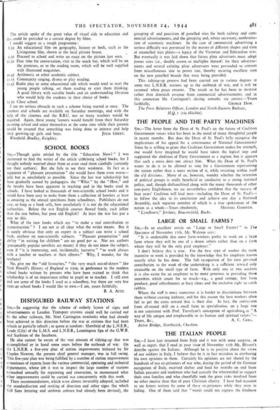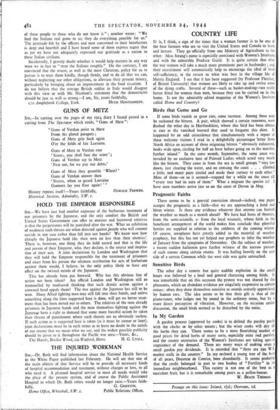THE ITALIAN PEOPLE have just returned from Italy and it
was with some surprise, as well as regret, that I read in your issue of November 17th Mr. Blissett's diatribe against the Italians. Although he is so positive about the views of our soldiers in Italy, I believe that he is in fact mistaken in attributing his own opinions to them. Certainly his opinions are not shared by the hundreds of our ex-prisoners of war who, during the period of the German occupation of Italy, received shelter and food for months on end from Italian peasants and workmen who had scarcely the wherewithal to support their own families and who cheerfully took the great risks involved from no other motive than that of pure Christian charity. I have had occasion to see letters written by some of these ex-prisoners while they were in hiding. One of them said that " words could not express the kindness
of these people to those who do not know it " ; another wrote: " We find the Italians real gems to us; they do everything possible for us." The gratitude felt by the officers and men concerned to their benefactors is deep and heartfelt and I have heard some of them express regret that as yet we have not adequately expressed our gratitude as a nation to these Italian civilians.
Incidentally, I gravely doubt whether it would help matters in any way were we in fact to " treat the Italians roughly." On the contrary, I am convinced that the wisest, as well as the most Christian, policy for us to pursue is to treat them kindly, though firmly, and to do all that we can, without neglecting our other obligations, to alleviate their present misery, particularly by bringing about an improvement in the food situation. I do not believe that the average British soldier in Italy would disagree with this view or with Mr. Nicolson's statement that the democracies should be just as well as strong.—I am, Sir, yours faithfully,



























 Previous page
Previous page